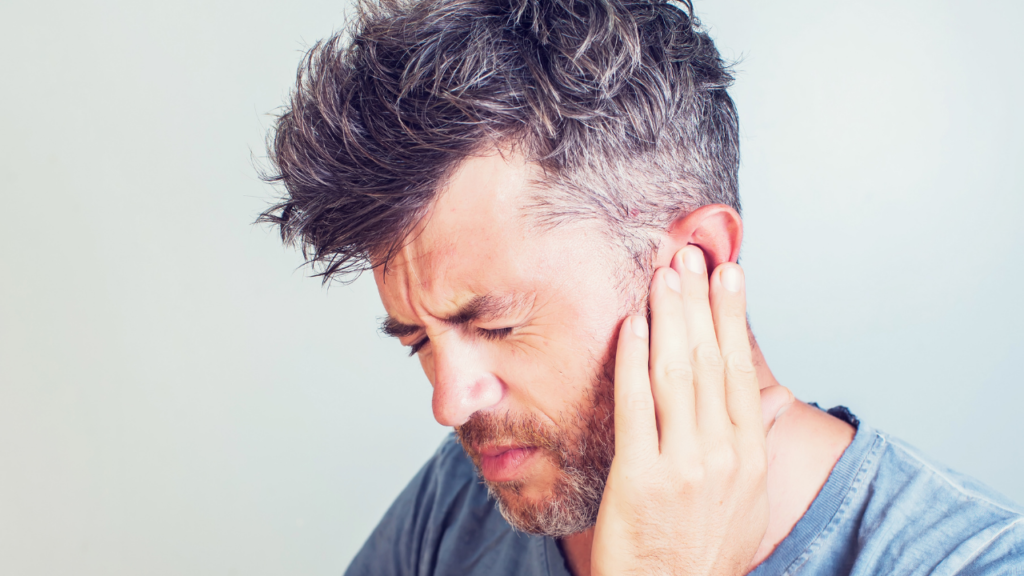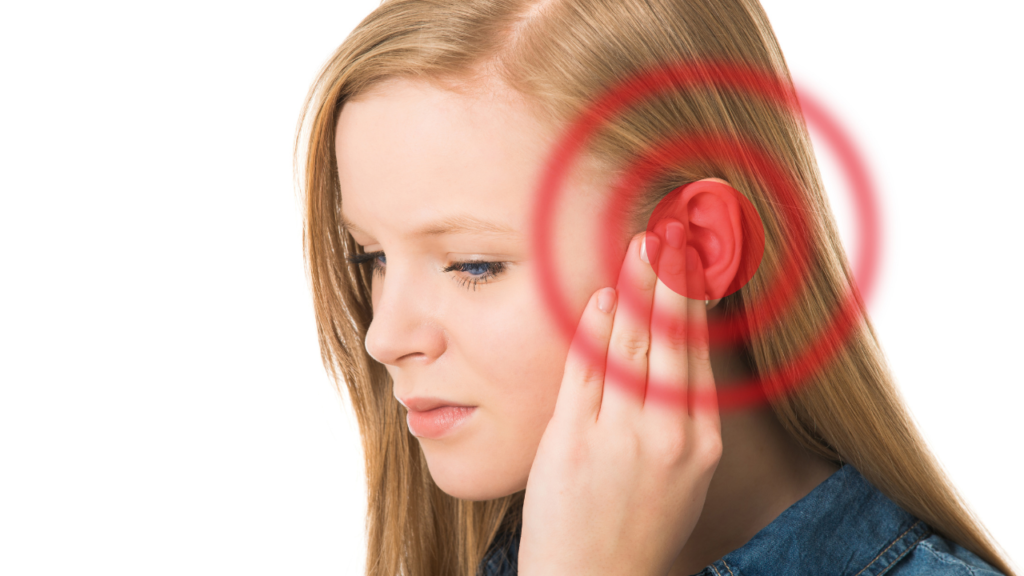Table of Contents
Exercise Daily – Are you wondering can tinnitus cause migraines? If so, then read this article to know the relation between tinnitus and migraines.
Tinnitus, which is a ringing, buzzing, clicking, or whistling sound in your ears that is not caused by anything external, might be the outcome of a migraine.
A condition of heightened sensitivity, according to scientific studies, maybe a contributing factor to this putative link, while there may be other factors at play.
What Is Tinnitus?
Hearing ringing or buzzing in the ears is a rather frequent occurrence, affecting around 10% of the general public. According to the American Tinnitus Association, tinnitus can be a cause of around 200 different medical disorders.
The following are some of the most common: age-related hearing loss, severe nasal or sinus congestion, excessive ear wax, temporomandibular joint (TMJ) problem, head and neck trauma, and head and neck cancer.
Although uncommon, there are some serious reasons for a combined headache and tinnitus, such as carotid artery dissection, a tear in the wall of your artery, or a traumatic brain injury, so it’s crucial to have your healthcare professional rule these out as possibilities.
Tinnitus and Migraines: A Correlative Study

Your tinnitus (an ear condition) may be interfering with your ability to concentrate (a brain problem). Here’s what the findings of the study indicate.
It is more likely that migraineurs will develop tinnitus or that they will already have the condition.
Tinnitus was discovered to have a relation to migraine in one study that included 1,645 French students.
Those who had a history of migraine were more likely than those who did not have a history of headaches to also have tinnitus.
A striking difference was that the association was greater for individuals who suffered from migraine with aura as opposed to those who suffered from migraine alone. So, now you know can tinnitus cause migraines.
According to another study published in 2018, experiencing migraines relate to a threefold increase in the likelihood of acquiring tinnitus (ringing in the ears).
The researchers discovered that migraineurs had a roughly threefold increased chance of having additional cochlear problems compared to individuals who did not suffer from the condition.
Laterality and Severity Relation
Approximately 200 volunteers with tinnitus and migraines took part in another study that aimed to better understand the association between migraine and tinnitus.
In their study, the researchers discovered a statistically significant link between tinnitus and headache laterality, which means that someone who has tinnitus in the right ear is more likely to also have head pain on the right side, and the same is true for the left side.
Nearly half of the individuals said that the severity of their tinnitus and headache was the same. Consequently, when their head pain got more acute, their tinnitus became more severe, and the other way around.
The association between tinnitus and migraines might be explained by central sensitization. It is called central sensitization when your brain and spinal cord acquire an abnormally heightened sensitivity to both things that should hurt, such as a needle prick, and things that shouldn’t hurt, such as a simple touch.
Migraines and tinnitus: A Symptom of Central Sensitization

The trigeminal nerve, which is the biggest cranial nerve, is believed to be responsible for migraines because pain fibers that arise from it emit pro-inflammatory peptides such as substance P and calcitonin gene-related peptides (CGRP) (CGRP).
It’s possible that these peptides are responsible for the throbbing pain associated with migraines. After reading this section, you will know can tinnitus cause migraines.
A condition known as central sensitization may develop after a series of migraine attacks, and this might be the cause of the development of tinnitus.
If you have tinnitus in one ear, it’s possible that it’s causing your trigeminal nerve system to become hypersensitive. It will result in headaches on the same side of your head.
However, research has shown that headaches are more likely to occur before tinnitus. Studies also suggest that the first idea may be more realistic at this stage.
Alternatively, it’s possible that a completely separate element, which we aren’t aware of, is responsible for both the migraines and the tinnitus symptoms.
The bottom line is that no one is quite clear what the link is between migraine and tinnitus is yet.
No matter how you look at it, research indicates that the combination of head discomfort and ringing in the ears is most likely the result of a biological process. It’s not simply a coincidence, to put it another way!
Options for Treatment
The symptoms of tinnitus can manifest themselves in many ways depending on the individual.
Depending on who you ask, it may be only a little irritation, but for others, it may be really debilitating, contributing to social isolation, elevated stress levels, sleep disruptions, and anxiety.
The good news is that, while there is no cure for tinnitus at this time, it is possible to manage it efficiently if you suffer from it. As a result, what works for someone else may not be the best treatment plan for you.
Your healthcare practitioner will determine the best treatment method for you based on your specific situation and the underlying cause of your tinnitus. This symptom may be alleviated with a successful migraine treatment regimen. Since we are talking about can tinnitus cause migraines, these treatments may help.
Effective Tinnitus-Relieving Strategies
The idea that tinnitus will become more severe over time is quite commonplace. The good news is that tinnitus, according to the American Tinnitus Association, does not often worsen over time. You can efficiently handle it by employing a number of different ways.
Continue reading to learn more about tactics that can help you feel better and regain control of your life.
Hydration
Since dehydration is a component that contributes to the worsening of tinnitus, maintaining enough water is an excellent and simple technique to try to alleviate it.
In Eastern medicine, hydration is really the first line of defense when it comes to treating Meniere’s illness.
Although recommendations differ, the 8 by 8 rule is a simple and straightforward concept to memorize. Each day, you should consume at least eight 8-ounce glasses of water, which is the recommended minimum.
Tinnitus Supplements
With a fast search on the internet, you’ll find a plethora of items on the market that claim to alleviate tinnitus symptoms. It’s worth trying out the goods listed below to determine whether they’re a good fit for you.
 Lemon Bioflavonoids
Lemon Bioflavonoids
They act by enlarging tiny capillaries and arteries, hence increasing blood flow and decreasing tinnitus symptoms.
In addition to experiencing calmer tinnitus, I have also experienced decreased ear pressure and fullness after commencing this supplementation.
However, true lemon bio-flavonoids must be used, not generic citrus bioflavonoids, which may be found in many supplements.
Vinpocetine
This one can take many weeks or even months to begin to diminish. Some people say that it can even completely remove tinnitus. Many people have also reported a reduction in a brain fog as a favorable side effect of the medication.
So, now you know can tinnitus cause migraines, it is important that vinpocetine can be helpful in this.
Ginkgo Biloba
Ginkgo Biloba is the supplement that has been examined the most for tinnitus. Some have had great benefits, while others have seen no change.
Ginkgo Biloba works by increasing circulation in the brain and inner ear while also lowering the production of potentially harmful free radicals.
B12
In a tiny trial, vitamin B12 showed promising outcomes in terms of lowering the volume of tinnitus in individuals who were deficient.
B2 Riboflavin
The association between migraine and tinnitus may explain why some people have success decreasing the level of their tinnitus by taking vitamin B2. If you get migraines, the suggested dose is up to 400mg daily.
The suggested riboflavin dose for tinnitus ranges from 25mg to 500mg per day, depending on the severity of the condition. For dose recommendations, it is important to consult with your doctor.
Melatonin
As of right now, it is unknown exactly how melatonin helps to alleviate tinnitus. What we do know is that melatonin aids in the improvement of sleep.
Because tinnitus gets worse by a lack of sleep, several ideas suggest that using melatonin for tinnitus can assist in regulating sleep and lower this risk factor.
Zinc
There was a tiny study that found that supplementing with 50mg of zinc daily can reduce the loudness of tinnitus, particularly in individuals who are zinc deficient.
Magnesium
Mineral magnesium supports nerve function and the health of the inner ear by relaxing muscles and blood vessels.
It also acts as a glutamate inhibitor, which is extremely effective. Magnesium supplementation may enhance the function of the ear. They may also alleviate tinnitus symptoms by minimizing the risk of hearing impairment caused by noise.
Because Migraine and Meniere’s disease patients are frequently more sensitive to noise than the general population, safeguarding your hearing between episodes should be a priority. After knowing can tinnitus cause migraines, you can use Magnesium to eliminate its risk.
CBD
CBD is a very recent addition to my arsenal of preventive treatments. It aids in the relief of mild discomfort and the reduction of tension, hence increasing relaxation. Tinnitus is less noticeable when stress levels are lower.
Essential Oils
Abby Angelico, one of our excellent moderators on Migraine Strong, advises helichrysum essential oil as a migraine treatment. She applies a small amount behind her ears in an attempt to minimize the intensity of her tinnitus symptoms.
Goodbye Tinnitus is a product available for purchase on Amazon. A mix of lavender and helichrysum essential oils is present, and we recommend that you dab it behind your ear.
Habituation
It is the process of conditioning our brains to accept tinnitus as meaningless background noise. It just means to shift your attention! Our minds are very remarkable.
You can completely eliminate tinnitus from your life if you stop focusing on it. Your brain is completely capable of doing so. In order to make that uncomfortable neural pathway more permanent in our brains, we may either focus on the anguish or distract ourselves from it by thinking about anything else.
Alternatively, we can prune out that upsetting neural pathway by altering our response to the sound. Our minds have the ability to and will tune it out with deliberate effort.
In the same way that our brains have learned to adapt to vertigo caused by vestibular migraine and Meniere’s illness, our brains will learn to compensate for tinnitus as well.
Habituation Device
Tinnitus masking devices, which are comparable to hearing aids, can be worn in the ear to assist teach your brain to become used to the sound.
In order to foster habituation and help you stop focusing on your tinnitus, these devices create a continuous tone. It specially tailors to match the frequencies of your tinnitus.
FAQs – Can Tinnitus Cause migraines
Can tinnitus trigger migraines?
Tinnitus, sometimes known as ringing in the ears, is a symptom that can be related to a variety of conditions, including migraine headache.
Despite the fact that vestibular migraine is the most prevalent kind of migraine related to tinnitus. However, there are several other types of migraine-related episodes that are also associated with tinnitus.
Can ringing ears cause headaches?
If you have tinnitus and headaches, it’s conceivable that an underlying ailment such as migraine will serve as a unifying explanation for the two symptoms.
It is possible that experiencing irritating tinnitus will set the setting for a headache to arise (for example, increased stress).
But technically, tinnitus itself is not the root cause of headaches.
Can tinnitus cause dizziness and headaches?
When tinnitus is severe, it might cause other symptoms such as dizziness, which can interfere with one’s regular activities.
Tingling in the ears is not a medical disorder but rather an indication of issues with the auditory system. Vertigo is a significant feeling of vertigo that frequently results in confusion and dizziness.
Conclusion
In the case of those who suffer from tinnitus and migraines, science has so far indicated that there is a correlation, presumably due to central sensitization.
It’s difficult to explain what this implies for you, other than that treating one condition may benefit the other.
Especially if the treatment targets the same mechanism that caused your migraine and tinnitus to develop in the first place.
The presence of a headache illness such as migraine may also have a significant impact on the way in which tinnitus damages your quality of life.









